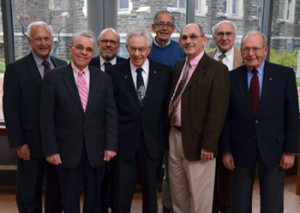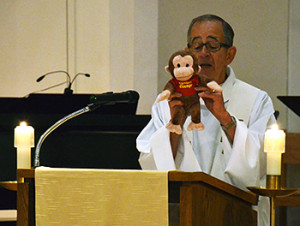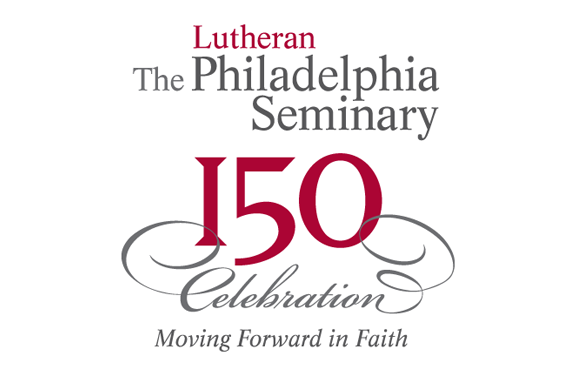
The Class of 1964 at Convocation.
Pr. Keck is in the back row, center.
A sermon presented by the Rev. George Keck for Eucharist on Wednesday, April 30, 2014 at the conclusion of the 2014 Spring Convocation. Pr. Keck is a member of the LTSP Class of 1964, and which celebrated its 50th anniversary at convocation. Among his many ministries following graduation, Pr. Keck served as LTSP Director of Admissions. The Gospel reading was John 20:19-31.
Pray with me: God of our future, in these days after Easter we find the disciples, hiding behind closed doors. The disciples are disillusioned about what is happening. They are uncertain about the future. Come to us gathered here today behind closed doors. We too are curious about the future, as we celebrate the past. Amen
 The older I get, the more curious I become. My wife even gave me a “Curious George” Monkey for my 50th year of ordination. I am curious about Thomas who always is part of our post Easter story. When it was evening on that day, the first day of the week, and the doors were locked for fear … Jesus came among them saying “Peace be with you…” But Thomas was not with them! Eleven disciples were disillusioned. Eleven disciples uncertain about the future. But not one of the 11 was curious enough to ask Jesus a question. Don’t know about you, but I am curious – why was Thomas missing that night?
The older I get, the more curious I become. My wife even gave me a “Curious George” Monkey for my 50th year of ordination. I am curious about Thomas who always is part of our post Easter story. When it was evening on that day, the first day of the week, and the doors were locked for fear … Jesus came among them saying “Peace be with you…” But Thomas was not with them! Eleven disciples were disillusioned. Eleven disciples uncertain about the future. But not one of the 11 was curious enough to ask Jesus a question. Don’t know about you, but I am curious – why was Thomas missing that night?
Then there is the second part of this post Easter story. A week later the disciples were in the house and this time … Thomas was with them. Once again, Jesus came and stood among them. Once again, Jesus said – “Peace be with you.” Once again, eleven of the disciples did not ask any questions. Only Thomas spoke up. Only Thomas was willing to call a spade a spade. Evidently, Thomas was curious about what was going to happen in the future. Thomas seems to want more than spoken words. Curious Thomas wanted something put into his hands for the future.
I wonder if Thomas’s curiosity might also provide a key for you and me during these uncertain days after Easter? These days when we gathered to celebrate 150 years of the Lutheran Seminary in Philadelphia? But what will happen during the next 150 years?
I was graduated from LTSP, 50 years ago. Only now do I realize how much happened in my life that I never expected. After 50 years, I am curious about how many unexpected things turned out to be some of the best things in my life.
- I left seminary faced with task of introducing a new “red” Service Book and Hymnal.” Later I was faced with introducing a “green” book. Then finally a “maroon” Evangelical Lutheran Worship book … But each one added something new to the life of George Keck!
- I left a seminary where there were no persons of color and no women in our class. Only to find that, as pastor, I was part of a congregation where both were present… plus more! And each new person added something new to the life of George Keck!
- Fifty years ago, I found myself in a denomination where no one wanted to talk about having a bishop; or ordaining women; or same-sex marriages. But all of these changes have added something new to the life of George Keck!
Over these past 50 years, as I have aged, I have come to value the power of curiosity. Age does bring some good gifts, like a Curious George gift from my wife. Mary Morrison, 86 year old Quaker woman, in her book “Let Evening Come,” says it this way.
One of childhood’s outstanding gifts is curiosity – endless curiosity about anything and everything. In old age we can look at the world and the people around us with a new openness. With age, we can regain curiosity that we once had as a child. We can have a new outlook and give up old habits for new ones.
Mary Morrison concludes – As I grow older I become “curiouser and curiouser.”
Why do so many in the church lose that childhood gift of curiosity as we grow up? Did we think of curiosity as “bad” – like being “a doubting Thomas?” Unfortunately, our lack of curiosity over the years seems to have resulted in resistance to change and fear of the future. And, without curiosity, the doors close all too quickly.
I guess that is why 500 years ago, the Protestant Reformers insisted that the Gospel must be more than spoken words. The Gospel needs to be visible for curious believers. That is why Luther said that God’s acceptance becomes visible in the waters of Baptism. That God’s word of forgiveness becomes visible in the bread and wine of Holy Communion.
I guess that is why Johannes Bugenhagen, Luther’s pastor, created a wooden box, a literal community chest, where money was collected to be shared with the poor. That wooden box, 500 years ago, was a visible sign of the Gospel caring for others in the midst of an uncertain economic future.
On that first Easter, something curious happened with the disciples hiding behind closed doors. Jesus come to them and said “Peace be with you.”Curious Thomas replied – I am OK with the spoken words. But I also need visible words. Something I can touch – taste – see. Something I can hold on to as I go into an uncertain future.
I don’t know about you, but I think that Thomas is not the only person that needs some visible words. I find myself living in a world that seems to be afraid to talk about an uncertain future. Afraid to talk about politics. Afraid to talk about economic inequality. Afraid to talk about sexuality. That is why this place – this seminary at Philadelphia – is going to be so important during the next 150 years.
I guess that as I grow older, I become “curiouser and curiouser” about how God gives us precisely what the world needs – the Gospel in visible words for curious believers.
Curiosity is makes “the church” a place where questions are asked and the doors are open.
During this convocation, you have heard plenty of spoken words. But now get ready.
Get ready, because God is waiting to put some visible words – bread and wine – into our hands and mouths here today.
Get ready for something we can touch and taste and take into the future.
Get ready! But now, I guess that I am even more curious about what you and I will do with God’s visible words for the next 150 years?
Amen

Leave a Comment